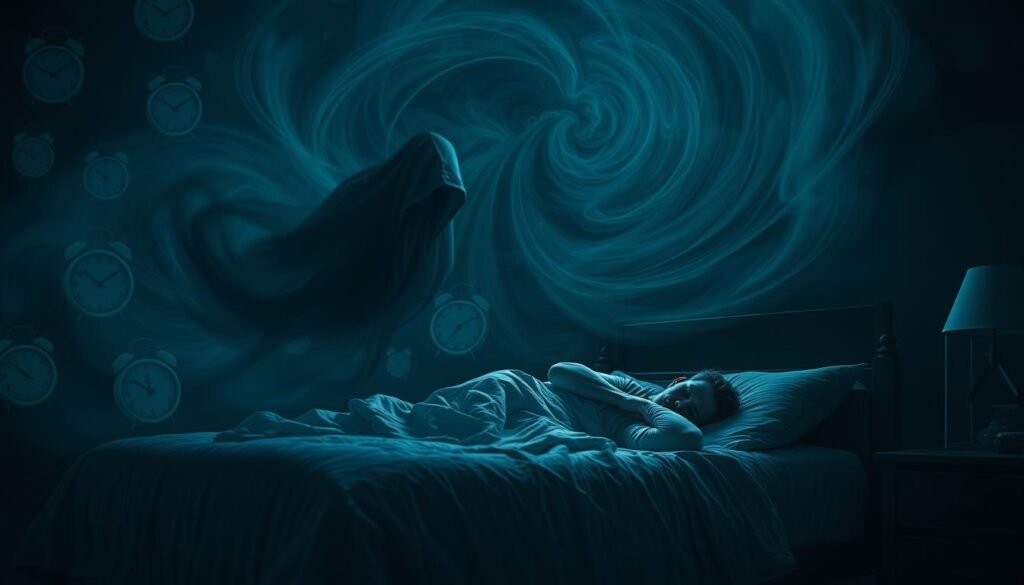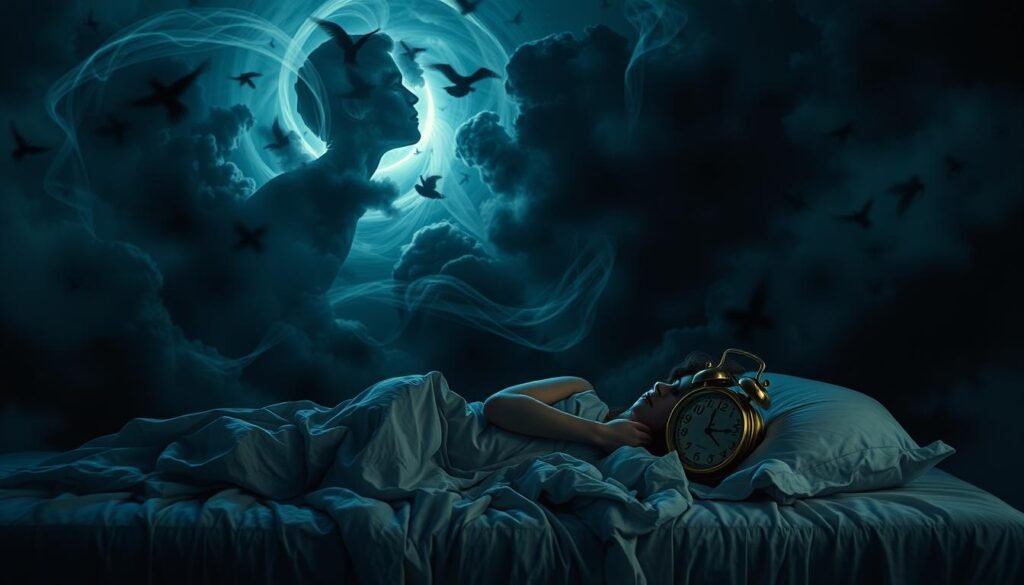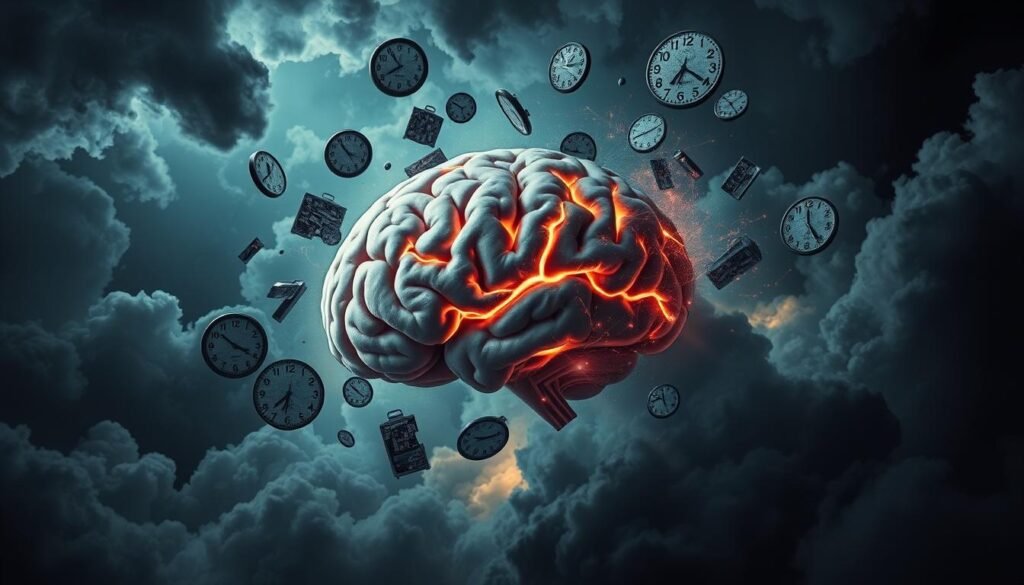Did you know that 24% to 36% of people with insomnia also face anxiety disorders? This shows how sleep anxiety and mental health challenges are closely linked. Sleep anxiety makes you worry about falling asleep. It often leads to chronic insomnia. This can make anxiety disorders like generalized anxiety disorder, panic disorder, and PTSD worse. The effects of sleep anxiety go further than just missing sleep. It can greatly affect your physical and mental health.
In the U.S., more people have been having trouble sleeping, especially since the COVID-19 pandemic. Sleep problems doubled during this time. This shows why it’s important to understand sleep anxiety better. By doing so, we can improve our life quality and mental health. When we address sleep issues and anxiety together, better sleep and health can be achieved.
Key Takeaways
- Approximately 24% to 36% of individuals with insomnia also suffer from anxiety disorders.
- The link between sleep disturbances and anxiety disorders such as GAD and PTSD is well established.
- Chronic anxiety can lead to significant sleep issues, impacting daily functioning.
- Effective strategies to manage sleep anxiety include establishing healthy sleep routines and practicing relaxation techniques.
- Understanding sleep anxiety is crucial for improving physical and mental health.
Understanding Sleep Anxiety
Sleep anxiety is a strong fear of not being able to fall asleep. It leads to a very alert mind, which makes sleeping hard. When someone worries about sleeping, it can cause insomnia. Insomnia, in turn, raises anxiety levels. Around 20% of adults in the U.S. struggle with sleep anxiety. This affects their daily life and mental health.
Anxiety disorders vary and affect sleep in different ways. They complicate sleep anxiety because they make sleeping problems worse. Lack of sleep can make you irritable, tired, and unfocused. This, again, increases anxiety. Also, not sleeping well can lead to more serious mental health problems.
We need to spread the word about how crucial sleep is for our health. By understanding sleep anxiety, people can get help, like Cognitive Behavioral Therapy. This treatment is effective for insomnia. Dealing with sleep issues can greatly improve our lives.
How Sleep Anxiety Contributes to Insomnia
Sleep anxiety greatly increases the risk of insomnia. It leaves individuals feeling tense and unable to relax. These feelings keep them alert, making it hard to fall or stay asleep. This cycle of anxiety and insomnia is tough for many.
People with anxiety often wake up during the night. They feel tired and unfocused the next day. Their motivation drops, and they might make more mistakes. High cortisol levels from lack of sleep raise anxiety, harming mental health.
There’s a strong link between sleep anxiety and handling emotions. Better sleep can reduce anxiety and help manage feelings. A report found stress affects the sleep of two-thirds of Americans. Many with anxiety also have insomnia, leading to worse mental health issues like depression.

The cycle between sleep anxiety and insomnia is hard to break. But, good sleep habits, relaxation, and therapy like CBT-I can help. These methods improve sleep and reduce sleep anxiety’s impact.
Impact of Sleep Anxiety on Health
Sleep anxiety greatly affects health. It touches both mind and body. People with sleep anxiety struggle with mental disorders. These can make stress and sadness worse. Anxiety disorders, very common in the U.S., can disrupt everyday life. About 23% of adults feel these negative effects.
Connection Between Sleep Anxiety and Mental Disorders
Sleep anxiety and mental disorders are closely linked. Many with depression also have anxiety. Disorders like Generalized Anxiety Disorder and Panic Disorder impact millions. Over half with PTSD have trouble sleeping. This shows how connected sleep and mental health problems are. Not sleeping well can lead to or increase anxiety.
Physical Health Consequences of Sleep Anxiety
Sleep anxiety can cause serious health issues. Lack of sleep is associated with high blood pressure and heart disease. It can also lower immune strength. Studies show that sleep problems like apnea can lead to more anxiety and depression. This impacts overall health. Hence, it’s vital to address sleep anxiety to live a healthier life.

The Psychological Effects of Sleep Deprivation
Sleep deprivation affects our minds in many ways. It makes it hard to focus, learn, and remember things. A lot of people fight with insomnia, which makes them perform worse every day. High stress and worry can come from this, making a bad cycle. It’s key to understand how lack of sleep and mental health are linked to find solutions.
Impact on Cognitive Functioning and Performance
Studies show sleep-deprived people do worse on mental tasks. With data from over 154 studies and 5,715 participants, those getting six hours of sleep or less had much more mental stress. In fact, their risk was about 2.5 times higher than those sleeping enough. Bad sleep doesn’t just make us less alert. It also takes away happy feelings like joy, raising big concerns for mental health.
Link to Chronic Fatigue Syndrome
Long-term lack of sleep can lead to chronic fatigue syndrome. This means being very tired even after you’ve rested. Sleep deprivation is a huge reason for this problem, making recovery hard with constant tiredness. Studies show over 30% of adults and up to 90% of teens don’t get the needed 7 to 9 hours of sleep. So, fixing sleep problems is crucial for better mind function, fighting fatigue, and improving our health.

Stress Management Techniques for Sleep Anxiety
Managing stress well is key to lessening sleep anxiety. Trying out mindfulness and relaxation can greatly improve how well you sleep. About 44% of adults have trouble sleeping due to stress at least once a month. By using relaxation techniques, you can make a better sleep environment for yourself.
Mindfulness and Relaxation Techniques
Mindfulness helps calm your mind and feelings before sleep. Doing yoga, tai chi, or meditation helps your body relax and cuts down stress hormones like cortisol. Spending 20 to 25 minutes each day on calm breathing or muscle relaxation can lessen stress. This makes falling asleep easier.
Progressive muscle relaxation is about tensing and then relaxing your muscles, from your head down to your toes. It helps find and ease tension. These methods not only help you sleep better but also improve your focus and mood.
Importance of Healthy Sleep Routines
Having a regular sleep routine is crucial for dealing with sleep anxiety. Sticking to a sleep schedule helps you sleep better. Try to get at least 7 hours of sleep every night. Limiting screen time before bed and creating a calm sleep setting can also help. Adding relaxation techniques to your bedtime routine tells your body it’s time to rest.
Keeping up these habits, along with staying active and eating well, makes life better. This is especially true for those with ongoing stress or health problems. For more ways to tackle sleep anxiety, check out Mood Care Health.
Addressing the Rise of Sleep Disorders
More people are now aware of sleep disorders. The problem is bigger than we thought before. Studies in the US show more people are having trouble sleeping, especially with COVID-19 around.
This issue needs urgent attention and solutions.
Statistics on Sleep Disorders in America
Many Americans are affected by sleep issues. A lot of adults don’t get enough sleep. Nearly one out of three people have symptoms of insomnia.
Seventeen percent of adults struggle with mental health. Sleep problems are common in high school students too. They often feel sad or hopeless.
Minority groups face even more sleep problems. This adds to their challenges.
Chronic Sleep Issues during COVID-19
The pandemic made sleep problems worse. Many high school students said their sleep and mental health got bad. Over half of Americans had more trouble sleeping because of the pandemic.
This highlights the need for public health actions. It’s important to connect sleep disorders with mental health. Looking into options like therapy and better sleep habits can help.
The Role of Nutrition in Sleep Quality
Nutrition plays a big role in how well we sleep. It affects our response to sleep problems, like sleep anxiety. Knowing how our diets impact our sleep is important for those who don’t sleep well. Some foods improve sleep quality, while others make it worse. This creates a difficult situation for many.
Foods That Promote Better Sleep
Eating certain foods can help us sleep better at night. Here are foods that are good for sleep:
- Tart cherry juice
- Kiwi fruit
- Oily fish like salmon and mackerel
- Milk and dairy products, such as cheese
- Poultry, including chicken and turkey
- Eggs
- Pumpkin seeds
- Whole grains and fibrous foods
- Beans and legumes
- Vegetables, particularly leafy greens
These foods have nutrients like tryptophan and help produce sleep hormones like melatonin. This leads to better sleep quality.
Foods to Avoid Before Bedtime
While some foods help with sleep, others can harm it. Here’s what you should avoid:
- Caffeine-containing beverages, including coffee and energy drinks
- Alcohol, especially close to bedtime
- High-sugar snacks or desserts
- High-fat meals, particularly spicy or greasy foods
- Foods low in tryptophan
- Simple carbohydrates in excess
Eating these foods can mess up your sleep by causing discomfort or making you more alert. Eating late or at irregular times also harms sleep quality.
Effective Treatments for Sleep Anxiety
To manage sleep anxiety effectively, a mix of psychological and drug treatments is often best. Cognitive Behavioral Therapy for Insomnia (CBT-I) and sleep disorder meds are critical. They help improve sleep quality and mental well-being when tailored to each person.
Cognitive Behavioral Therapy for Insomnia (CBT-I)
Cognitive Behavioral Therapy is a top method for dealing with sleep anxiety and insomnia. CBT-I focuses on the negative thoughts and behaviors that mess with sleep. It helps people:
- Identify and challenge sleep-related beliefs.
- Establish healthy sleep habits.
- Manage anxiety surrounding sleep.
Studies show that CBT has lasting benefits for insomnia and can show results in 6 to 8 sessions. This approach is popular as it tackles the root of sleep issues without relying on drugs.
Medication Options for Anxiety and Sleep Disorders
Meds for sleep troubles can offer quick relief. They mainly help with symptoms but don’t get to the problem’s cause. Benzodiazepines, like alprazolam and diazepam, and non-benzodiazepines, such as zolpidem, are common choices. Selective serotonin reuptake inhibitors, like paroxetine and trazodone, also treat anxiety and insomnia.
But, using these drugs for a long time can cause dependency and withdrawal. So, doctors often suggest pairing meds with Cognitive Behavioral Therapy. This provides a fuller treatment for sleep anxiety.
Conclusion
Sleep anxiety really affects our minds and bodies, making us feel and function worse. Going to bed late, like after 1 a.m., can make this even worse, leading to more anxiety and depression. But sticking to a good sleep schedule helps keep your mental health in check.
To fight sleep anxiety, trying things like mindfulness or relaxation can help. Eating right is also key for better sleep. And if sleep problems get really bad, things like Cognitive Behavioral Therapy for Insomnia (CBT-I) can make a big difference.
Dealing with sleep issues is important for overall health. Whether by following natural sleep rhythms or seeking therapy, taking action leads to a better life. For more on how sleep affects health, check out this study.